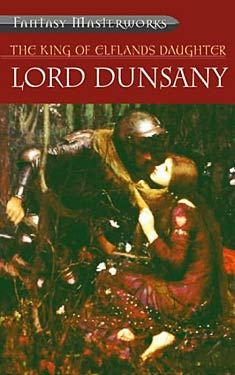Lord Dunsany
Completed 5/25/2020,
Reviewed 5/25/2020
4 stars
This book
was published in 1924 and is considered a classic of fantasy literature. Like the early classics of science fiction, it
may not be as accessible to modern readers.
I found it hard to get into because of the language and style, but after
about twenty pages, it just flowed. It
has been described as poetic, and indeed it has a lot of beautiful
language. It is rather short on plot and
characterization. Critics have said that
his style was better suited to short stories.
I would agree with that statement.
Nonetheless, it is a beautifully written work with just enough magical
subplots that it kept me going until the end.
 The people
of the all but forgotten land of Erl asked their lord that their land be ruled
by a magic lord. In response, he sent
his eldest son Alveric to Elfland to win the hand of Lirazel, the King of
Elfland’s daughter. He steals her away,
but as time is different between Earth and faerie, the lord has died and
Alveric becomes the new lord and Lirazel his lady. Together they have a son, Orion. Lirazel, however struggles with the fact that
she must worship the same god as Alveric.
So she practices on the stars and stones. Thinking this is heathen behavior, Alveric
constantly reprimands her. She
despairs. In the meantime, her father,
who was not happy that she left Elfland, has sent her a rune that would whisk
her back. In her despair, she says
goodbye to her son, reads the rune, and is blown back to Elfland. Distraught, Alveric begins a search for her,
leaving Orion to grow up under the care of his nurse, who is a witch, and under
the influence of two hunters. Orion
becomes a skilled hunter, but longs for his mother.
The people
of the all but forgotten land of Erl asked their lord that their land be ruled
by a magic lord. In response, he sent
his eldest son Alveric to Elfland to win the hand of Lirazel, the King of
Elfland’s daughter. He steals her away,
but as time is different between Earth and faerie, the lord has died and
Alveric becomes the new lord and Lirazel his lady. Together they have a son, Orion. Lirazel, however struggles with the fact that
she must worship the same god as Alveric.
So she practices on the stars and stones. Thinking this is heathen behavior, Alveric
constantly reprimands her. She
despairs. In the meantime, her father,
who was not happy that she left Elfland, has sent her a rune that would whisk
her back. In her despair, she says
goodbye to her son, reads the rune, and is blown back to Elfland. Distraught, Alveric begins a search for her,
leaving Orion to grow up under the care of his nurse, who is a witch, and under
the influence of two hunters. Orion
becomes a skilled hunter, but longs for his mother.
The best
part of the book is the prose. It is
perhaps the most beautiful prose I’ve ever read. However, I felt the prose got in the way of
the plot. There are many times throughout
the book where nothing much really happens.
For example, there’s one whole chapter about a troll who sits up in the
pigeon loft of the castle, feeling lonely, looking down upon Erl and its
people, and wishing he could communicate with the pigeons. It was a little tedious. But hey, there is a troll. There’s also a witch, a unicorn, and a magic
sword. It’s all these magical things
that make keep the prose from becoming too oppressive.
Even though
the plot description above sounds like it could be exciting, it really isn’t. There isn’t much that happens between Lizarel
blowing away and the ending. Life simply
goes on. Orion becomes a great hunter
like his fathers before him. He hunts
stags, and later unicorns. He befriends
the troll who becomes part of his hunting party. Lizarel pines for Alveric and Earth. Alveric hunts for Lizarel. There aren’t many perils along the way for
anyone. There’s no real action to speak
of. And there’s no real character
development. Everyone just is. I liked the witch though. She has a good soliloquy about using magic
against magic.
I give this
book four stars out of five. I was going
to give it only three, but it is too beautifully written. You have to remember that this was published
a few years after Tolkien had started writing his Lost Tales. If you read that and the Silmarillion, you can
see the style isn’t all that different, although Tolkien’s stories had more
plot and character development. Still
they are tough reads, though written beautifully, as this book is. I think when you read this book, you have to
wipe your mind of everything you know about fantasy and let it be a new
experience. Try not to think of who was
influenced by Lord Dunsany, and try not to criticize it for being boring. Fantasy at this point wasn’t even a genre
yet. If you cut it some slack, you’ll
better be able to appreciate it.
I have a really nice copy of this on a shelf downstairs. I know I picked it up years ago after several authors I liked talking about being influenced by the book.
ReplyDelete